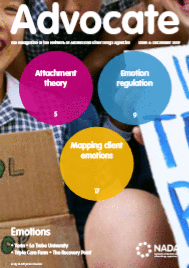 This edition of the Advocate [PDF] explores the theme emotions, a topic that is central to the AOD field; I would like to consider this topic at the broader social and policy level.
This edition of the Advocate [PDF] explores the theme emotions, a topic that is central to the AOD field; I would like to consider this topic at the broader social and policy level.
I am pleased to note that in a recent series published in The Lancet, researchers from the National Drug and Alcohol Research Centre (NDARC) urge policymakers (read: our politicians) to dump morally charged punitive measures from our current policy approach and instead, turn to the evidence to reduce drug related harm. Most pointedly I note the editors, Dr Pam Das and Dr Richard Horton in an accompanying comment piece, wrote, ‘Policies that might improve the lives of people with health problems relating to drug use are not seen as substantial vote winners.’
I wonder about this statement in the context of the Australian Government’s recent proposal to drug test welfare recipients. The Prime Minister has declared that the ordinary Australian do not want to see their taxes used for welfare payments made to ‘people who are using it on drugs’. This casts the trial as a moral and social imperative. And so too, our Premier’s negative response to the calls to provide pill testing at music festivals and related drug law reforms to lessen the negative impact these laws have on people who use drugs.
Based on the evidence, the policy approach of ‘get tough on drugs’ and punish people who use them does not seem to be working to reduce harms, and may in fact be increasing them.
The point that the NDARC above mentioned article made is that the political approach to drugs and drug policy that rely on moral and social prejudices is failing to help with the development of sound evidence based drug policy and program development.
So, what underpins the government’s response to drug policy, if it is not the evidence? News media plays a crucial role in shaping policy decisions. They influence the type of public debate that occurs: they control what is said, by whom and the optimum solutions. Not only that, but the negative and fearsome framing of AOD issues by sections of the media and popular culture inform the community’s beliefs. Media’s representations strongly influence attitudes and opinions, because many in the community are quite unfamiliar with illicit drugs.
And so, government leaders tend to respond with negativity to evidence based drug policy and approaches.
I say it is time to stop reacting emotionally to drug use issues. It is time to recognise the human rights of people who use drugs and offer them the same support and protection through evidence based solutions and interventions we offer to anyone, and all.
One way to reduce fear and blame is to improve knowledge and attitudes about illicit drugs and the people who use them, and knowledge and understanding about substance use and recovery. Researchers, again, are leading—see the online resources described in the ‘research into practice’ article.
I know from member feedback that you too, would like to address stigma and discrimination. Let’s discuss what we can do together, as a sector—come along to the NADA Conference 2020 in June.
—Larry Pierce
Related resources and videos
No related posts.